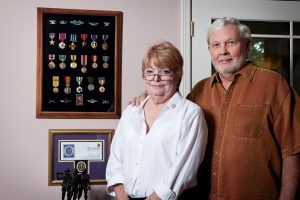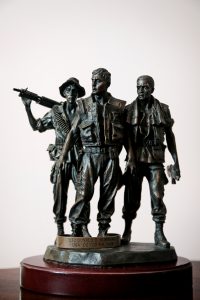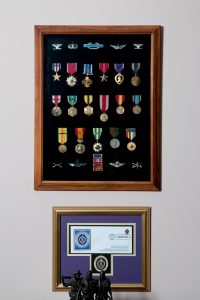By Suzanne Dowling
Photography by Samantha Hernandez
In 2010, the U.S. Army reported the suicide rate among Army personnel was above the civilian rate for the first time since the Vietnam War.
Dr. Jo Pryce and retired Col. David Pryce, members of The University of Alabama’s School of Social Work, say the timing is not coincidental.

“Our government failed to plan for the human costs of the war on terrorism, especially with the effects multiple deployments have on the veteran and his or her family,” says Jo Pryce, an associate professor.
“It is yet another ‘inconvenient truth’ that must be faced squarely with the same commitment and courage that our young men and women face daily on the battlefield,” says David Pryce, an adjunct faculty member in the UA School of Social Work.
David Pryce served two tours in Vietnam, earning three awards of the Silver Star and two Purple Heart medals during his service for the U.S. Army.
“The social work community as a whole, with a few significant exceptions, has been slow to come to terms with the world-wide conflict in which we have been engaged for several long years with no definite end yet in sight,” says Jo Pryce.
The Council on Social Work Education’s annual meeting in 2007 reflected the neglect of military issues, Jo Pryce says.
“Of the myriad sessions and offerings at that conference, not one dealt with our war veterans and their families. And only a handful of books deal minimally with war veterans and their families.”
Recently, Jo Pryce notes, the Council developed a response to military families and created a military track for a later conference.
The Pryces’ concern led them to co-author, along with Dr. Kim Shackelford of the University of Mississippi, the book, “The Cost of Courage: Combat Stress, Warriors & Family Survival.”

According to the Pryces, the book (under review) shines a bright light on government successes and shortcomings and offers suggestions for professional social workers as to how to make things better for a seriously underserved population.
The book’s purpose, the Pryces say, is to inform the reader about the horrific nature of war and its human costs so social workers and other helping professionals can better understand, and relate to, warriors and their families.
It gives social workers detailed background on the U.S. military and surrounding issues including: special needs of military families (preparing for deployment, separation, and reintegration during post-deployment), the “invisible wounds of war” (traumatic brain injury, post-traumatic stress disorder, major depressive episodes), as well as contemporary issues (homelessness, incarcerated veterans, and special challenges faced by military women).
Student veterans also face unique difficulties, the Pryces say, when dealing with multiple deployments.
“Many faculty members do not know that National Guard service members are in the U.S. military and part of the ‘Total Force,’ Jo Pryce says. “They are activated and deployed to both war zones just like regulars. They may also have to go to training sessions and therefore miss class sessions.
“These students would like to see the policies for student athletes be put in place for them so they can make up class work, tests and assignments without penalty.”
She also notes that one of the frequent problems student veterans experience is that their accommodation requests from campus offices of disability are not understood or appreciated by faculty.
“For instance, TBI (traumatic brain injury) may leave a person looking perfectly normal, but they may have serious memory problems and migraines. The faculty member may dismiss their accommodation request,” she says.
The Pryces say interviews Shackelford conducted with soldiers and their families yielded significant content for the book. One of those soldiers is David Yancy.
Yancy, a social work student at Mississippi, served 71 days active duty in Iraq during 2005 and then spent two years trying to mend from an extensive injury after his tactical vehicle was hit with an Improvised Explosive Device.
“The Washington Post and the Army Times interviewed him after working with the Washington Post to expose a bureaucratic system at Walter Reed Army Medical Center that was broken and not properly serving injured warriors,” says David Pryce. “Many wounded warriors were housed in buildings that were run down, had cracks and mold. Yancey’s testimony contributed to the improvement of those conditions.”
“He has also worked to improve services for injured soldiers and gave an account of what his experience was like and the experiences of others he knew (at Walter Reed),” says Jo Pryce.

“Several soldiers told (Shackelford) that people asked them the most inappropriate questions upon his or her return,” says David Pryce.
“One soldier explained this by saying. ‘I hated the thousand questions that people asked about the war and being over there. Especially questions like: How many people did you kill? Did you kill anyone? Did you shoot your guy? Did you get hurt? Did anyone you know get hurt? I hated those questions. People should know not to ask about that stuff,’” he said.
“They speak out about several difficulties and challenges, but they also express many positives about military experience,” says David Pryce.
So, what can be done by the social work community to help soldiers and their families?
Jo Pryce said the book’s suggested solutions include:
- integrating information about the military’s culture and its members’ needs, issues, and strengths into undergraduate social work programs;
- including best practices and eclectic approach within the field’s clinical programs; and
- involving soldiers, veterans and their families within specialized graduate courses.
“Few have been asked to sacrifice anything for the war effort,” says David Pryce. “Indeed, the only Americans who sacrifice are the members of our armed forces, their families and friends. We must try to do everything we can to meet the overwhelming need to mend and strengthen our returning warriors and their loved ones.”